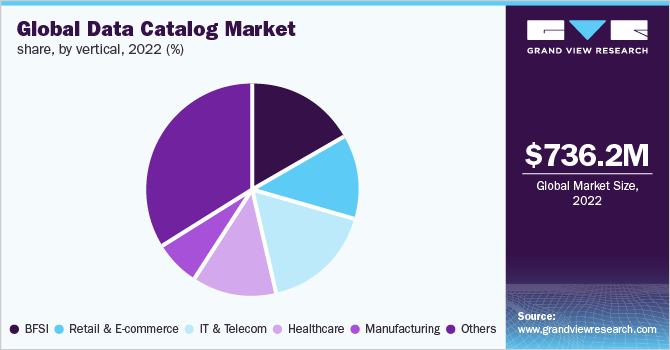Data Catalog Market Growth: Future Outlook, Trends, and Industry Insights
The global data catalog market is witnessing strong growth, driven by the increasing volume and complexity of enterprise data and the need for efficient data management and accessibility.
The global data catalog market size was valued at USD 736.2 million in 2022 and is expected to reach USD 3.86 billion by 2030, growing at a CAGR of 23.2% from 2023 to 2030. A data catalog is a centralized solution that enables authorized users to access a company’s most accurate and up-to-date business data efficiently.
It serves as a repository for all organizational data sources, allowing both technical and business users to search, request, and retrieve datasets needed to execute projects, perform daily operations, and generate analytical reports. With the rapid growth of enterprise data, data cataloging has become essential for large organizations. Additionally, data visualization techniques that tell a story can provide significant value once a data catalog system is in place.

Modern data catalogs gather metadata from multiple sources, including cloud object storage, data lakes, data warehouses, and NoSQL databases. Advanced digital workplace platforms now provide data catalog features as a single source of reliable information. Organizations prioritize catalogs that offer versatile search and filtering, technical metadata integration, and automation through AI and machine learning.
With the expansion of the Internet of Things (IoT), extracting insights from incoming data has become increasingly critical. Most unstructured data—such as emails, account records, and historical document versions—does not directly support decision-making. Data catalogs help organizations organize and synthesize corporate data from multiple sources into a clear, actionable format, supporting industries like BFSI, healthcare, retail, and e-commerce in strategic decision-making.
Data catalogs can be developed using third-party tools or custom-built solutions. While custom-built catalogs may have lower licensing costs, they require more time and effort for acquisition, ingestion, and presentation. In contrast, third-party solutions offer ready-to-use functionality, reducing implementation time but often at a higher total tool and licensing cost.
Key Market Trends & Insights
- North America dominated the market in 2022, accounting for over 38% of global revenue.
- By metadata management tools type, the technical metadata segment led with over 54% of global revenue in 2022.
- By deployment mode, the on-premises segment accounted for over 55% of global revenue in 2022.
- By data consumer, the enterprise applications segment held the largest market share at over 43% in 2022.
- By vertical, the IT & telecom segment held the largest revenue share of over 16% in 2022.
Download a free sample PDF of the Data Catalog Market Intelligence Study, published by Grand View Research.
Market Performance
- 2022 Market Size: USD 736.2 Million
- 2030 Projected Market Size: USD 3.86 Billion
- CAGR (2023–2030): 23.2%
- North America: Largest market in 2022
- Asia Pacific: Fastest growing market
Competitive Landscape
Key players in the data catalog market are focusing on product launches, expansions, mergers and acquisitions, contracts, partnerships, and technological innovations to strengthen their market presence. Companies are acquiring early data catalog providers to expand their offerings.
For example, in January 2020, Hitachi Vantara acquired Waterline Data, integrating its technology into Lumada Data Services to create a common metadata framework. This helps organizations overcome data silos across data centers, clouds, and edge devices.
Suppliers from different sectors are expanding their capabilities to include data cataloging, including Tableau, Alteryx, IBM Watson, and Informatica. According to Ramesh Menon, Product Management VP at Infoworks, DataOps cannot be effectively performed without a data catalog, highlighting the growing strategic importance of these solutions.
Key Companies
- Alation Inc.
- Apache Software Foundation
- Hitachi Vantara Corporation
- IBM Corporation
- Informatica Inc.
- Microsoft Corporation
- Oracle Corporation
- Precisely Inc.
- Talend Inc.
- Zaloni, Inc.
Explore Horizon Databook – the world’s most comprehensive market intelligence platform by Grand View Research.
Conclusion
The global data catalog market is witnessing strong growth, driven by the increasing volume and complexity of enterprise data and the need for efficient data management and accessibility. Data catalogs empower organizations to streamline data operations, enhance decision-making, and improve data governance. With ongoing adoption across BFSI, healthcare, retail, and IT verticals, coupled with AI and machine learning integration, the market is poised for robust expansion through 2030, establishing data catalogs as a critical enabler of digital transformation and DataOps initiatives.